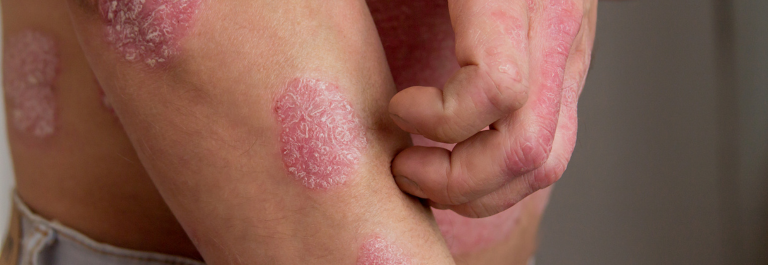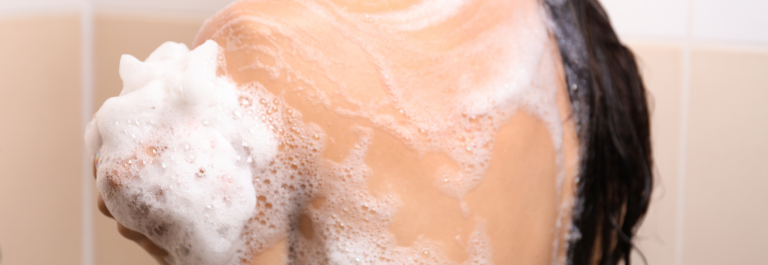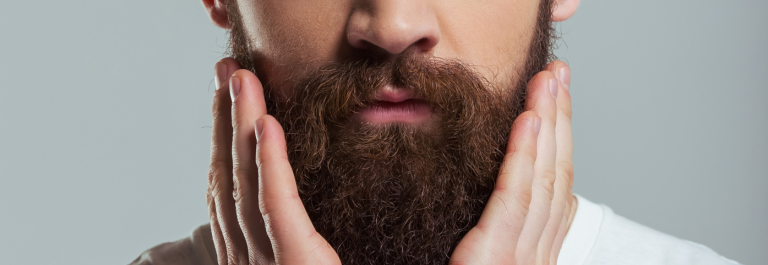According to the National Psoriasis Foundation, up to 90% of people with psoriasis experience itching, which is often characterized by a burning, stinging, or biting sensation.
While itchy skin tends to be nothing more than an annoyance for some, depending on your disease severity, psoriasis itching can take a real toll on your quality of life, making day-to-day tasks extremely uncomfortable, disrupting your sex life, and impacting your mental health.
If this sounds familiar, we're here to break down everything you need to know about:
-
The fundamental causes and symptoms of psoriasis
-
Why psoriasis gets so itchy
-
The best ways to find lasting itch relief
Keep reading to learn more about managing your psoriasis symptoms naturally and effectively, breaking the itch-scratch cycle, and giving your skin the best chance of recovery.
What is Psoriasis?
Psoriasis is a chronic, inflammatory skin condition that impacts more than 7.5 million Americans today. It is characterized by inflamed areas of rough, scaly skin patches, otherwise known as 'plaques.'
Inflammation caused by psoriasis can also impact other organs and tissues in the body, with one-third of psoriasis patients developing psoriatic arthritis.
Types of Psoriasis
The most common type of psoriasis is plaque psoriasis, which typically develops across the face, elbows, and knees.
Other varieties include scalp psoriasis and guttate psoriasis, the latter typically triggered following a bacterial infection.
Causes
For people with psoriasis, a dysfunctional immune system causes the body to over-produce new skin cells too rapidly. This leads to the developing of well-defined, thick, silvery-white scaly patches of excess dead skin cells.
While the exact cause of psoriasis is unknown, scientists believe it's brought about by a combination of genetic and environmental factors, with some of the most common triggers for psoriasis flares including hot showers, sweating, emotional stress, harsh chemicals, dry weather, wearing synthetic fabrics, illness, and certain medications.
Psoriasis symptoms
While psoriasis is going to manifest differently for every individual, there are some characteristic symptoms to keep an eye out for:
-
Thick patches of silvery skin flakes are found most commonly on the elbows, knees, and scalp (although they can appear anywhere on the body).
-
Skin inflammation
-
Skin discoloration - psoriasis patches tend to appear red or pink on paler skin and brown or ashen grey for people with darker skin tones.
-
Intense itching, often accompanied by a burning sensation.
Why Does Psoriasis Cause Itchy Skin?
Inflammation is the body's natural process of fighting infection and responding to wounds.
In the case of psoriasis, however, the excessive inflammation around scaly skin plaques is registered by the nervous system as an itching sensation, which gets even worse when you scratch.
That's because scratching creates tiny ruptures in the skin barrier, leading to moisture loss and damaging the nerve endings in your skin.
Effective Treatments for Psoriasis Itch
If your itchy psoriasis is starting to get in the way of your day-to-day life, there are thankfully many ways to relieve intense itching.
Topical Treatments: Anti Itch Creams
The Organic Manuka Skin Soothing Cream is made from soothing manuka honey, olive oil, and beeswax. Apply this creamy balm to any inflamed areas across your body to help nourish and hydrate your dry, cracked skin to break the itch-scratch cycle.
In the case of severe psoriasis, where you may be at risk of infection, you can rest assured that the potent anti-inflammatory and antibacterial properties of manuka oil will help to keep you safe from disease.
Afterward, slipping a psoriasis Sleeve over the affected area is a great way to help avoid irritating your skin again. These Remedywear™ Psoriasis Sleeves (Bandages) were created to help cover small itchy patches and provide large-scale relief across legs or arms. Made with eco-friendly TENCEL embedded with zinc oxide, these psoriasis bandages provide long-lasting comfort day and night.
Bathing To Soften Skin Scales
The stubborn build-up of dead skin cells is one of the main contributors to psoriasis itch. We recommend finding safe and natural ways to soften and exfoliate your skin plaques to calm your psoriasis flare.
Rather than picking at your flaky skin (which can worsen your itchiness), try adding colloidal oatmeal or dead sea salts to your bathtub. These products naturally soothe irritated skin and soften scales, which can be gently brushed off when moisturizing.
Be sure to use a gentle soap-free from harsh chemicals, such as this Coconut and Sunflower Oil Soap Bar, while bathing.
Cold Compresses
Many people with psoriasis find that cold compresses help to relieve their itchy skin. According to the American Academy of Dermatology, the nerve endings sending itch signals to the brain don't work as well when they're cold.
Wrap an ice pack in a towel or cloth to create a cold compress, and apply this to your psoriasis scales for a few minutes to relieve the itch.
Managing Symptoms Long-term
While it's all well and good treating psoriasis itch after a break-out, if you want to get serious about preventing your psoriasis flares, there are a few lifestyle changes we'd suggest taking on board.
Reduce stress
Managing stress is one of the most effective ways to control your psoriasis. We know this can be hard in the busy hecticness of day-to-day life. Still, you must allow yourself to rest whenever needed, find fun daily activities that bring you joy, and make space in your diary for relaxing hobbies like yoga or meditation. Your skin will thank you!
Take Cooler Showers
Hot water makes your psoriasis plaques feel even itchier. That's because it dries out your skin and promotes inflammation. To help yourself long-term, try bathing or showering in lukewarm water instead.
Balance Sun Exposure
According to the National Psoriasis Foundation, getting up to 15 minutes of sunshine daily with no sunscreen can work wonders for your sensitive skin. Wearing no sunscreen for these short periods helps to allow your skin to breathe, safe from some of the many chemicals in skin products that can increase inflammation.
It's essential to find the right balance because too much sun can increase your risk of skin cancer.
Soothe Psoriasis Itching Today
Follow these tips to help you and your loved ones relieve itchy psoriasis today, soothing dry skin and improving your quality of life in the long term.










